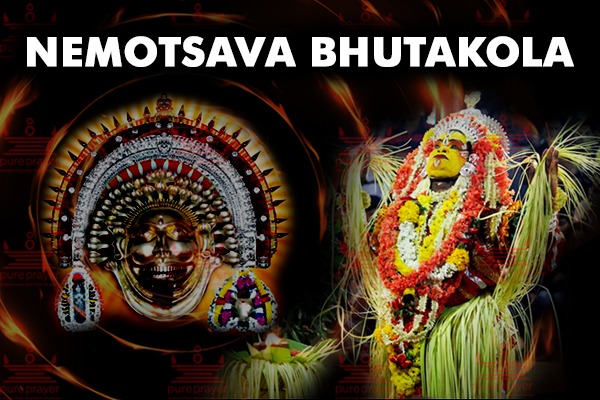The Guardian Spirits are here to stay
PurePrayer brings you a glimpse of Nemotsava or Bhutakola, a ritual performed in the coastal line of Dakshina Kannada better known as Tulu Nadu. Bhuta Kola is an ancient practice of paying homage to local spirits, who are thought to protect the locals and maintain the delicate cosmic balance between nature and man.
It is a sultry early evening, and the place has a festive look. The shrine of the local deity known as Daivada Mane or Daivada Sthala (the house of the Daiva – the demigod) is gorgeously decorated. The idol of Daiva has been taken on a procession and is back home to talk to His people. The atmosphere smells of glowing lamps, burning torches, and low-explosive fire crackers called “Garnal” by the natives. Amidst the mela and “paad-dana” or “pardana” (singers reciting the legend of the demigod like a ballad), the Daiva Nartaka (the person who channels the energy of Demigod) has beautifully besmeared his face with indigenous colours and has adorned himself with traditional jewellery. He is dancing in his formalised manner, while the pair of Gaggara on his ankles (a copious anklet used by folk dancers) tinkle to suit his steps. The crowd is in rapt attention when the dancer matches his movements to the rising rhythm of the mela.
There is mysticism in the air. Yes, you are in Tulunadu (a part of coastal Karnataka) and witnessing Nemotsava, also known as Bhoota Kola.
Bhuta Kola Practices
Bhuta Kola is an ancient practice of paying homage to local spirits, who are thought to protect the locals and maintain the delicate cosmic balance between nature and man. The recent Kannada movie “Kantara”, which created waves in the world of cinema, showcased this age-old ritual splendidly to the whole wide world.
Bhootakola tradition differs from place to place depending on Daiva worshipped. The mela and the colours used for the Nartaka’s make-up also vary depending on the demigod. The demigods are many, while the popular ones are Panjurli, Guliga, Jumadi Banta, Varthe, Kalkuda-Kalkurti or Kallurti, Koti-Chenaya, Pilichandi, Bobbarya, Koragajja, and so on. The spirits or Bhootas are worshipped in the form of animals, nature or human beings. Kola is usually a dusk-to-dawn annual event. However, the frequency can be more than once if it is a Harake (an offering given by a family or an individual in return for a favour from the divine).
The belief is that Daiva is invoked through the dancer (Nartaka). Possessing or channelling the energy of the Daiva cannot be learnt by all. It is mostly a tribal aptitude passed on from one generation to another. The Nartaka, who holds the spirit of the Daiva, has divine messages to give to his people during the Kola. The spirit, through the Nartaka, is relied upon to resolve disputes among his people, answer queries about their personal lives, and offer solutions to their worries.
It is a day when the whole village comes together to celebrate their Guardian Spirit. The elaborate preparations start a few weeks before, with the family that is organising the Kola sending out invitations to one and all. A grand feast known as “Anna Santharpane”, is arranged for all the visitors that night. Finally, the Nartaka possessed by the demigod is offered puffed rice, tender coconut, ash gourds, and pingara (areca flowers), depending on Daiva. The big night comes to an end with the custodian spirit departing with a promise to return the following year. The Daiva can also express His pleasure with the ceremony.
Like many other rituals that defy ordinary human logic, Bhoota Kola too has had its share of unanswered questions. However, one has to agree that this ancient tradition is an inseparable part of the Tuluva beliefs and culture. The Daivas, however fierce or gentle, are here to stay with their people, guarding their boundaries and standing up for them always.
PurePrayer is a leading online platform offering Purohit Services of experienced and Vedic Pandits in all the Metro Cities of India like Chennai, Delhi, Gurugram, Hyderabad, Kolkata, Mumbai, Mysuru, Pune and many others as well as in Teertha Kshetras across India. We provide the services of Bengali Pandits, Hindi Pandits, Kannada Poojaris, Kashmiri Pandits, North Indian Pandits, Tamil Vadhyars, Telugu Purohits, Marathi Guruji, Malayalam Pandits, Oriya Pandits and many more. Pandits are available in Offline or Remote support format.
Please visit www.pureprayer.com or call us on +91 8151002255, WA No: +91 9606036988 to learn more about booking online Pandits/Purohits for all Pujas, Havans and many more.



Review
Vidya
Beautiful! Brings bhootakola to life with words .